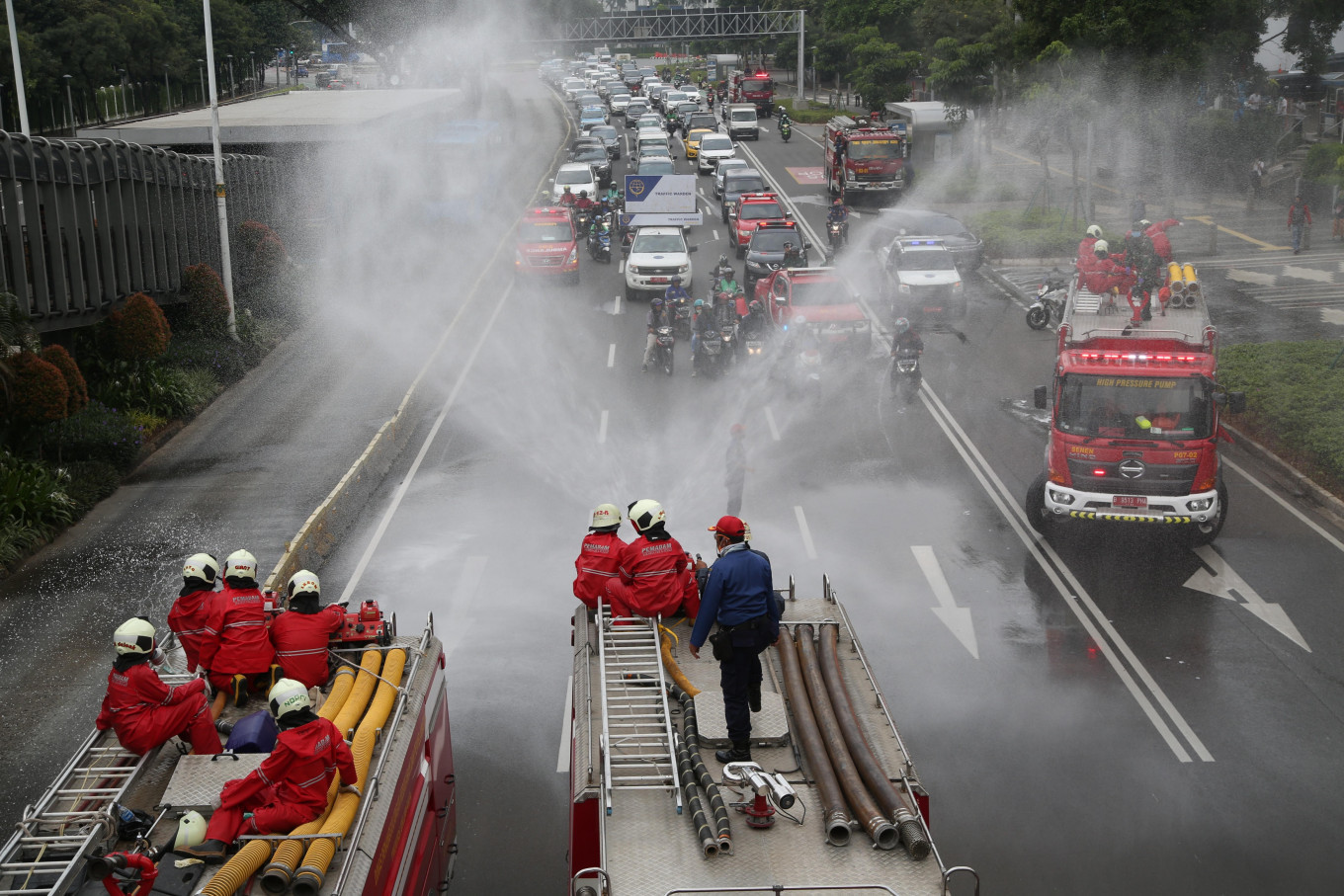Popular Reads
Top Results
Can't find what you're looking for?
View all search resultsPopular Reads
Top Results
Can't find what you're looking for?
View all search resultsActivists warn government not to repeat mistakes of past economic bailouts
Change text size
Gift Premium Articles
to Anyone
A
ntigraft activists have called on the government to be transparent in the disbursement of the recently unveiled Rp 405.1 trillion (US$24.68 billion) COVID-19 economic stimulus in order to avoid the pitfalls of past corruption cases in 2008 and in 1998.
The government issued a regulation in lieu of law (Perppu) on March 31, allowing policymakers to take “extraordinary measures” to cushion the economy from the negative impacts of the outbreak. The regulation gives Financial System Stability Committee (KSSK) members legal protection to carry out their respective duties as long as those are done “in good faith” and with respect to existing law.
The KSSK is a forum chaired by the Finance Minister, with members including the Bank Indonesia (BI) governor and the heads of the Financial Services Authority (OJK) and the Deposit Insurance Corporation (LPS).
Article 27 of the Perppu stipulates that the funds spent by the government in carrying out such policies are part of the economic costs to save the country from economic crisis and will not be counted as state losses.
Submitted to the House of Representatives on April 2, the legislation is still awaiting lawmakers’ approval.
Indonesia Corruption Watch (ICW) activist Kurnia Ramadhana called on the government to exercise prudence in making any future decisions under the Perppu mechanism, given the impunity provision.
“If there is potential for corruption, don’t allow the economic stimulus be a pretext for such offenses,” Kurnia said. “Don’t be hasty in taking any decisions that might potentially become corruption offenses.”
He said that past corruption cases relating to government interventions to save the economy should be taken as a lesson by President Joko “Jokowi” Widodo’s administration.
During the 1998 financial crisis, BI provided liquidity support (BLBI) to commercial banks to restore public faith in banks as they suffered massive runs, but most of the money was later found to have been embezzled.
The Corruption Eradication Commission (KPK) brought former Indonesian Bank Restructuring Agency (IBRA) chairman Syafruddin Arysad Tumenggung to a corruption court in September 2018 for his involvement in the BLBI embezzlement case.
Syafruddin was sentenced to 13 years’ imprisonment for discharging Sjamsul Nursalim, the owner of Bank Dagang Negara Indonesia (BDNI), from repaying the government. He was found guilty of causing Rp 4.58 trillion in state losses.
In a July 2019 in a cassation trial at the Supreme Court, Syafruddin was acquitted of all the charges.
The bailout of Bank Century in 2008, meanwhile, turned into a political scandal with lawmakers questioning the ballooning cost of bailing out the bank, which amounted to Rp 6.76 trillion. The House launched in 2010 a legislative inquiry into the Century case that almost led to former president Susilo Bambang Yudhoyono being impeached.
In July 2014, the Jakarta Corruption Court sentenced former BI deputy governor Budi Mulya, the first suspect in the case investigated by the KPK, to 10 years in jail. The investigation, however, has since moved at a snail’s pace, prompting the Indonesian Anti-Corruption Community (MAKI) to file a pretrial motion against the KPK, which was accused of being “slow” in its handling of the case.
Transparency International Indonesia's (TII) Wawan Sujatmiko said the two past cases showed that Jokowi’s administration should start to draft guidelines detailing mechanisms to ensure any future economic stimulus-related policies are in line with prevailing laws before implementing the Perppu.
“The government must ensure that amid the extraordinary conditions caused by the [COVID-19] pandemic it doesn’t become unaware or neglectful of potential corruption when it begins implementing the economic stimulus,” he said.
Policymakers appeared to be determined to avoid any moral hazard in implementing the Perppu.
“We are very aware that we must be very careful to avoid moral hazard,” Finance Minister Sri Mulyani Indrawati told reporters last week. “We will formulate a safeguard so that policymakers that are taking measures to improve public health and the economy cannot be criminalized because of the acts of others.”
Center of Reform on Economics (CORE) Indonesia research director Piter Abdullah said a much better oversight mechanism offered by the KPK, the Supreme Audit Agency (BPK) and the ministry’s inspectorate general today would leave little wiggle room for policymakers to play foul.
Piter said that unlike in the 1998 crisis, in which the BLBI funds came from the central bank, or in the 2008 scandal when the LPS funding was used to bail out Bank Century for fear of the systemic risks it posed to the financial system, the 2020 crisis playbook used a much safer route by leveraging state spending through the issuance of bonds.










